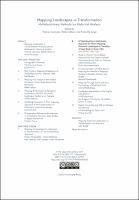Chapter 8 A High-Resolution Multi-Scalar Approach for Micro-Mapping Historical Landscapes in Transition
A Case Study in Texas, USA
Author(s)
McKee, Arlo
Yuan, May
Contributor(s)
Coomans, Thomas (editor)
Cattoor, Bieke (editor)
De Jonge, Krista (editor)
Language
EnglishAbstract
"The relational complexity of urban and rural landscapes in space and in time.
The development of historical geographical information systems (HGIS) and other methods from the digital humanities have revolutionised historical research on cultural landscapes. Additionally, the opening up of increasingly diverse collections of source material, often incomplete and difficult to interpret, has led to methodologically innovative experiments. One of today’s major challenges, however, concerns the concepts and tools to be deployed for mapping processes of transformation—that is, interpreting and imagining the relational complexity of urban and rural landscapes, both in space and in time, at micro- and macro-scale.
Mapping Landscapes in Transformation gathers experts from different disciplines, active in the fields of historical geography, urban and landscape history, archaeology and heritage conservation. They are specialised in a wide variety of space-time contexts, including regions within Europe, Asia, and the Americas, and periods from antiquity to the 21st century."
Keywords
digital humanities; historical geography; urban history; landscape history; archaeology; heritage conservation; architectureDOI
10.2307/j.ctvjsf4w6ISBN
9789462701731OCN
1135848886Publisher
Leuven University PressPublisher website
https://lup.be/Publication date and place
Leuven, 2019Imprint
Leuven University PressClassification
History of architecture
Industrialisation and industrial history
Landscape archaeology
Industrial archaeology


 Download
Download Web Shop
Web Shop